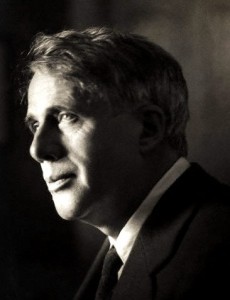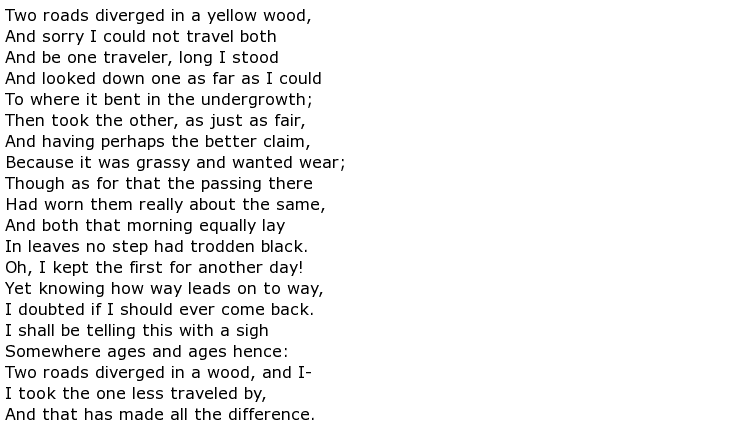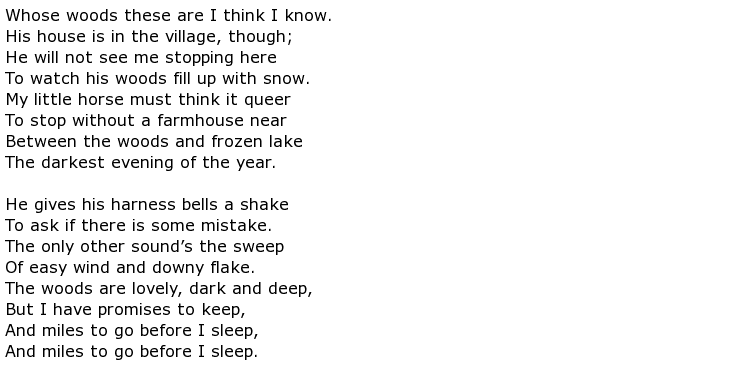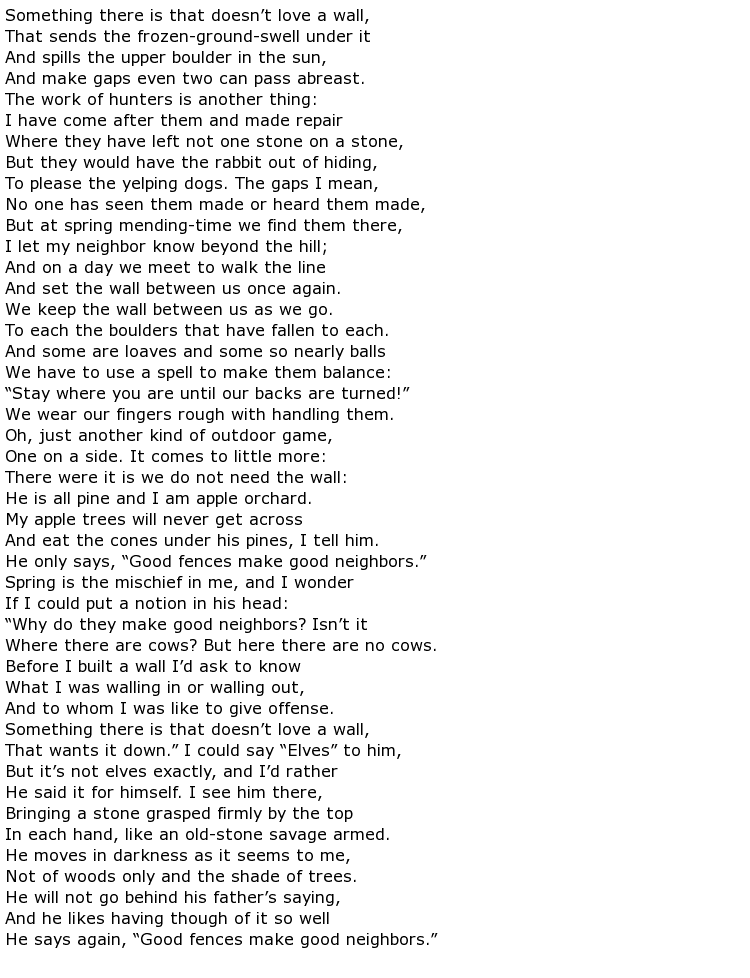Robert Frost Poems
- ‘Out, Out–‘
- A Boundless Moment
- A Brook in the City
- A Cliff Dwelling
- A Dream Pang
- A Fountain, a Bottle, a Donkey’s Ears, and Some Books
- A Girl’s Garden
- A Hillside Thaw
- A Hundred Collars
- A Late Walk
- A Line-storm Song
- A Minor Bird
- A Passing Glimpse
- A Patch of Old Snow
- A Peck of Gold
- A Prayer in Spring
- A Question
- A Servant to Servants
- A Soldier
- A Star in a Stoneboat
- A Time to Talk
- A Winter Eden
- Acceptance
- Acquainted With the Night
- After Apple-Picking
- An Empty Threat
- An Encounter
- An Old Man’s Winter Night
- Asking For Roses
- Atmosphere
- Bereft
- Birches
- Blue-Butterfly Day
- Bond and Free
- Brown’s Descent
- But Outer Space
- Canis Major
- Carpe diem
- Christmas Trees
- Come In
- Departmental
- Desert Places – Robert Frost
- Design
- Devotion
- Dust in the Eyes
- Dust of Snow
- Evening in a Sugar Orchard
- Fire and Ice
- Fireflies in the Garden
- Flower-Gathering
- For Once, Then, Something
- Fragmentary Blue
- Gathering Leaves
- Ghost House
- Going for Water
- Good Hours
- Good-by and Keep Cold
- Hannibal
- Home Burial
- Hyla Brook
- I Will Sing You One-O
- I. The Witch Of Coos
- II. The Pauper Witch of Grafton
- Immigrants
- In a Disused Graveyard
- In a Vale
- In Hardwood Groves
- In Neglect
- In the Home Stretch
- Into My Own
- Leaves Compared With Flowers
- Locked Out
- Lodged
- Looking For a Sunset Bird in Winter
- Maple
- Meeting and Passing
- Mending Wall
- Misgiving
- Mowing
- My Butterfly
- My November Guest
- Neither Out Far Nor In Deep
- Never Again Would Bird’s Song Be The Same
- New Hampshire
- Not To Keep
- Nothing Gold Can Stay
- Now Close the Windows
- October
- On a Tree Fallen Across the Road
- On Going Unnoticed
- On Looking Up By Chance At The Constellations
- Once By The Pacific
- One Step Backward Taken
- Our Singing Strength
- Pan with Us
- Paul’s Wife
- Pea Brush
- Place for a Third
- Plowmen
- Provide, Provide
- Putting in the Seed
- Range-Finding
- Reluctance
- Revelation
- Riders
- Rose Pogonias
- Sand Dunes
- Sitting by a Bush in Broad Sunlight
- Snow
- Spring Pools
- Stars
- Stopping by Woods on a Snowy Evening
- Storm Fear
- The Aim was Song
- The Armful
- The Ax-Helve
- The Bear
- The Birthplace
- The Black Cottage
- The Bonfire
- The Census-Taker
- The Cocoon
- The Code
- The Cow In Apple-Time
- The Death of the Hired Man
- The Demiurge’s Laugh
- The Door in the Dark
- The Egg and the Machine
- The Exposed Nest
- The Fear
- The Flood
- The Flower Boat
- The Freedom of the Moon
- The Generations of Men
- The Grindstone
- The Gum-Gatherer
- The Hill Wife
- The Housekeeper
- The Investment
- The Kitchen Chimney
- The Last Mowing
- The Line-Gang
- The Lockless Door
- The Mountain
- The Need of Being Versed in Country Things
- The Onset
- The Oven Bird
- The Pasture
- The Peaceful Shepherd
- The Road Not Taken
- The Rose Family
- The Runaway
- The Silken Tent
- The Soldier
- The Sound of the Trees
- The Span Of Life
- The Star-Splitter
- The Telephone
- The Thatch
- The Times Table
- The Trial by Existence
- The Tuft of Flowers
- The Valley’s Singing Day
- The Vanishing Red
- The Vantage Point
- The Wood-Pile
- They Were Welcome To Their Belief
- To E.T.
- To Earthward
- To the Thawing Wind
- Tree At My Window
- Two Look at Two
- Two Tramps In Mud Time
- Waiting
- What Fifty Said
- Wild Grapes
- Wind and Window Flower
Robert Frost Biography
 During the mid-twentieth century, there was no poet more beloved in the United States than Robert Frost. Considered the unofficial poet laureate of the nation, Frost’s poems were more widely read than almost any other poet’s work, his poetry was part of every English course in America’s curriculum, and not surprisingly, his poetry was among the most familiar lines among most of America.
During the mid-twentieth century, there was no poet more beloved in the United States than Robert Frost. Considered the unofficial poet laureate of the nation, Frost’s poems were more widely read than almost any other poet’s work, his poetry was part of every English course in America’s curriculum, and not surprisingly, his poetry was among the most familiar lines among most of America.
Robert Frost was born in 1874 in California to a journalist father, William Frost, and a former schoolteacher, Isabella. After his father’s death when he was an adolescent, Frost and his mother relocated to New England to live with family. He would remain a resident of New England most of his life.
Although his grandfather saw to it that Frost received an excellent education, he was an indifferent student, attending both Dartmouth and Harvard without earning a degree. He held a number of jobs to support himself, among them textile mill worker, cobbler, Latin teacher, and farmer.
Despite his various careers – plus marriage and children – Frost dedicated himself to his poetry. It was not, however, well-received in the early stages of his writing career. The Atlantic Monthly rejected his work on at least one occasion.
For a time, Frost and his family relocated to England. This proved fortuitous for his poetry; at nearly 40 years of age, his first poetry collection, A Boy’s Will was finally published, to international acclaim.
Despite his success in England, Frost returned again to New England, teaching, writing, and co-founding the Bread Loaf School of writing in Vermont. He continued to write and publish his poetry to eager audiences, gaining a reputation as one of America’s finest, most popular poets. He was honored by the U.S. Senate, the American Academy of Poets, and was a recipient of the Congressional Gold Medal and the Edward MacDowell medal. He traveled throughout the world, sharing his poetry with distinguished leaders, considered an American treasure.
However, Frost’s success came along with disappointments. By the time of his death in 1963, he’d outlived his wife and four of his five children, several of whom suffered from mental health issues, and one of which committed suicide. The disappointments may have been great, at his death, Frost was considered one of the cornerstones of American poetry.
The popularity of Frost’s poetry has not dimmed in the years since his death. Among his most popular poems are:
The Road Not Taken

Stopping By Woods on a Snowy Evening

Mending Wall
